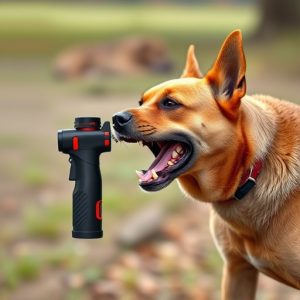Dog Pepper Spray: Effectiveness, Legalities, and Safer Alternatives for Restricted States
Dog pepper spray, though effective against aggressive dogs, faces varying legal restrictions globall…….
Dog pepper spray, though effective against aggressive dogs, faces varying legal restrictions globally, especially in Dog Pepper Spray Restricted States. Its legality varies widely, with some areas banning it due to animal welfare concerns. Pet owners considering its use must understand local laws, explore safer alternatives like citronella-based sprays or training methods, and adhere to strict disposal guidelines if permitted.
Dog pepper spray has emerged as a controversial yet potentially life-saving tool for managing aggressive canine behavior. This article delves into the safety, legality, and alternatives surrounding dog pepper spray, offering a comprehensive guide for those in restricted states seeking effective deterrents. We explore the active ingredients, their effects, and the legal landscape, providing insights to empower responsible ownership while ensuring safety and compliance.
- Understanding Dog Pepper Spray: Active Ingredients and Safety
- Legal Status of Dog Pepper Spray: A Comprehensive Overview
- Effective Deterrents for Dog Aggression: Alternatives to Pepper Spray
- Responsible Use and Disposal: Ensuring Safety in Restricted States
Understanding Dog Pepper Spray: Active Ingredients and Safety
Dog pepper spray, also known as dog spray or capsaicin spray for dogs, is a non-lethal deterrent designed to temporarily incapacitate and deter aggressive dogs. It’s composed of capsicum, a compound found in chili peppers, which irritates the eyes, nose, and throat when inhaled. Understanding what makes it effective and safe is crucial when considering its use.
While dog pepper spray can be an effective deterrent in many situations, it’s important to note that regulations differ across states. Some states have restrictions or outright bans on the use of pepper spray against dogs due to concerns about animal welfare and safety. Before using dog pepper spray, pet owners should research and comply with local laws, ensuring they only employ it as a last resort when facing an imminent threat from an aggressive canine.
Legal Status of Dog Pepper Spray: A Comprehensive Overview
The legal status of dog pepper spray, also known as canine repellent or dog spray, varies across different states and regions worldwide. While some areas have banned its use due to concerns over animal welfare and public safety, others recognize it as a valuable deterrent for guarding pets and property against aggressive dogs. In the United States, for instance, dog pepper spray is generally legal at the federal level but falls under strict regulations in certain states, such as California, New York, and Illinois, where its sale and possession are heavily restricted or prohibited entirely.
These restrictions often stem from concerns about misuse, accidental exposure, and potential harm to bystanders, especially children and pets. Some states have specific rules regarding the type of pepper spray allowed, its concentration, and permitted users, typically law enforcement or individuals with valid permits. Understanding the legal landscape surrounding dog pepper spray is crucial for owners considering its use, as it varies significantly from one region to another, influencing accessibility and safety guidelines.
Effective Deterrents for Dog Aggression: Alternatives to Pepper Spray
When dealing with dog aggression, pepper spray has long been considered a common deterrent. However, due to its potential for misuse and harmful effects on both dogs and humans, many areas have implemented restrictions or outright bans on dog pepper spray. In such cases, it’s crucial to explore alternative, safe, and effective deterrents.
One promising option is the use of citronella-based sprays, which can be highly effective in deterring aggressive dogs without causing harm. Other natural deterrents include specific scents like lavender or sage, which can help calm dogs and prevent aggressive behavior. Additionally, training and behavior modification techniques, such as positive reinforcement, have proven to be game-changers in managing dog aggression. These methods not only offer a safe alternative but also foster a healthier and more positive relationship between pets and their owners.
Responsible Use and Disposal: Ensuring Safety in Restricted States
In many regions, dog pepper spray is subject to strict regulations and considered a restricted item due to its potent nature. When using dog spray in these areas, it’s paramount to adhere to local laws and guidelines for responsible ownership. This includes proper storage, as designated by state or provincial authorities, ensuring the product is kept out of reach of children and pets.
Disposal methods vary across restricted states, with some requiring special waste collection programs. It’s crucial to follow these guidelines to minimize environmental impact and maintain safety standards. Responsible disposal protects both human health and the local ecosystem from any potential risks associated with dog pepper spray.
Dog pepper spray has emerged as a powerful tool in managing dog aggression, but its legal status varies across Restricted States. While it proves effective as a deterrent, understanding the active ingredients and responsible usage is crucial to ensure safety. Alternatives exist, but for those in areas where it’s legal, dog pepper spray offers a quick response to potentially dangerous situations. Always prioritize safety and adhere to local regulations when considering this method.


